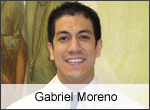
Gabriel Moreno, a third-year student at the Wayne State University School of Medicine, has received the prestigious Minority Scholars Award and the Ronald Davis Scholarship from the American Medical Association Foundation.
Only 13 of the $10,000 awards were granted across the nation. The AMA Foundation works to increase the number of minority physicians. The award recognizes academic achievement, leadership and community involvement.
"I'm very humbled as I truly feel that I've only done what is my responsibility and nothing more," Moreno said. "From what I've read of Dr. Ronald M. Davis, it seems he was an incredible man. He was quoted as saying to the National Medical Association, 'This is also the moment we can stand as one, in tireless advocacy for diversity in health care, especially within the physician population, that at a minimum reflects the diversity we see among those who need care.' Out of all of the medical schools in the state, I think Wayne State has the greatest ability to do this. We just have to believe we can do it and keep working."
Moreno, 27, of Saginaw, Mich., completed his undergraduate studies in movement science at the University of Michigan. He selected Wayne State University for his medical training so that he could remain close to his family and because he believed he could "learn a lot at Wayne State considering its location and strong commitment to community involvement."
After medical school, Moreno sees himself in a residency program in Illinois, California or Michigan. He plans to enter the field of neurology because of his interest in movement disorders and dementia.
"Gabriel is the son of Mexican immigrants, born and reared in Saginaw, Michigan. He is a living example of a son of immigrants who is pursuing the American dream," said Hector Gonzalez, Ph.D., assistant professor of Family Medicine and Public Health Sciences, and the Institute of Gerontology. "Gabriel is the most committed, dedicated, energetic, intelligent and resourceful trainee I have encountered in my career. He is a natural and strong leader who has demonstrated remarkable skills in organizing and rallying toward important goals."
Moreno's interest in medicine began when, as a child, he wanted to learn more about his father's Parkinson's disease, coupled with his fascination with his mother's clinical experiences as a registered nurse.
He helped launch and served as president of the Latin American & Native American Medical Association at the School of Medicine. "When I arrived at Wayne, I was shocked to find that we have by far the lowest amount of Latino students of the medical schools in the state, and given our class size of 300, it could be the lowest percentage in the Midwest," Moreno said. "However, outside of Chicago, we have the largest concentration of Latinos in the Midwest in our area. This is one of the reasons we started the LANAMA, not to say that Latinos are different or special in some way, but rather to address the concerns of the Latino demographic."
He also serves as the grassroots organizer for the American Medical Student Association's Race, Ethnicity and Culture in Health Committee. REACH works to reduce health disparities between racial, ethnic and cultural groups through advocacy, education and service. Its goals include strengthening cultural competency in medical education, promoting diversity of the physician workforce and empowering future physicians to engage in political and social movements to bring about health equity.
"I'll be happy when we are truly working to promote diversity at the Wayne State School of Medicine, no longer overlooking the Latino demographic, and I can say that we are honestly working toward all forms of diversity simply because it's just," he said.
Moreno also has been president and a member of the American Medical Association group, and a member of the World Health Student Organization and the American Medical Student Association.
His mentors include Diane Levine, M.D., associate professor of Internal Medicine; Wilhelmine Wiese-Rometsch, M.D., assistant dean of Graduate Medical Education; Felix Valbuena, M.D., clinical assistant professor of Family Medicine; Richard Lewis, M.D., professor and associate chair of Neurology; and Maryjean Schenk, M.D., M.P.H., M.S., vice dean of Education.